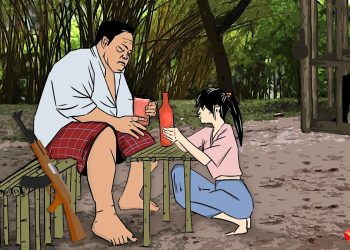INLE LAKE, Shan State — As revelers gather at Inle Lake in Shan State to celebrate the famed Phaung Daw Oo Pagoda festival, another group of concerned volunteers has teamed up to do the dirty work: picking up trash generated by the thousands of people that flock to the lake for the event.
About 100 young people wearing bright yellow T-shirts have joined a local volunteer group named Innsar Lu Khae to raise awareness about the negative impact of indiscriminate disposal of waste, with the team going around on motorized boats to collect trash during the festival.
“We want to stop the littering habit and we want to educate people on the impact of plastic waste and how the trash in the lake affects the environment. When people saw us collecting trash, they stopped themselves from throwing trash into the water and gave the trash to us,” said Maung Pyone, one of the youth leaders of the conservation campaign.
Innsar Lu Khae—meaning Intha Youth in reference to the ethnic Intha peoples of the lake—said that more than 30 kilograms of plastic waste per day have been collected over the course of the festival, which runs from Sept. 24 to Oct. 11.
The campaign is not the first of its kind for many of the volunteers, who work in their respective villages each week to collect waste in an effort to reduce the plastic and other forms of refuse that otherwise would not make it into a garbage bin.
The 18-day pagoda festival, which draws thousands of Buddhist pilgrims across the country, has the negative side effect of leading to a marked increase in trash thrown into the lake by celebrants. The spike in visitors and attendant rise in pollution is the reason the campaigners have turned out en masse this year.
“We did the campaign en masse during the festival because we want every resident and visitors to know that Inle Lake needs to be clean. Our campaign is to create awareness for both the [ethnic] Inthas and the visitors, not to litter into the lake,” he said. “Another reason is that we don’t want our pagoda festival to be the festival that destroys the lake.”
Although the group has endeavored to clean up the lake, their environmental caretaking has also bred another environmental concern.
“Currently, we’ve pile up this trash in an area which is far from the villages, and have to burn it since most of the trash is plastics. Burning the trash like this is not a suitable way, but we have no choice yet. We still need a better solution to handle this trash,” he said.
The campaigners said collecting trash alone would not save Inle Lake, which is under environmental pressures that range from deforestation and siltification to chemical pollution and the effects of climate change.
People living around Inle had for generations used the lake both for drinking water and household tasks like washing clothes or bathing. But in the 1990s, the use of fertilizer in Inle’s famous floating gardens, along with population growth and drought, began to take its toll on the purity of the lake water.
In 2009, following a particularly acute spell of drought blamed on climate change and deforestation of the surrounding land, environmentalists and scientists issued a warning that the lake’s water required urgent attention to prevent severe contamination. According to the experts, the lake’s pH levels tested in the range of 8.4 to 9.6, indicating degrees of alkalinity that made the water unsuitable to drink.
Since then, residents of Inle have had to fetch potable water from the natural springs located on the east and west banks of the lake.
Another concern of lake dwellers is overdevelopment, as a hotel zone on the east bank of the lake has seen hundreds of acres of land cleared of trees to make way for the region’s growing tourism industry.
“Collecting garbage alone will not save the lake from disappearing. We need to stop the flow of silt into the lake as well. For that, we can’t work alone. We need every concerned person from every sector to take care of the environment, deforestation, usage of chemicals and the habit of littering,” said Ashin Dhama Daza, a leading monk from the Phaung Daw Oo Pagoda monastery who is supporting the young volunteers.
“We would like to request to both residents and visitors not to litter on the lake and help us to create a clean environment for the sake of this beautiful lake,” he added. “I would also like to request to those hotels and businessmen not to harm the nature. Please don’t kill us. Our lives depend on the lake, we need clean water.”

















